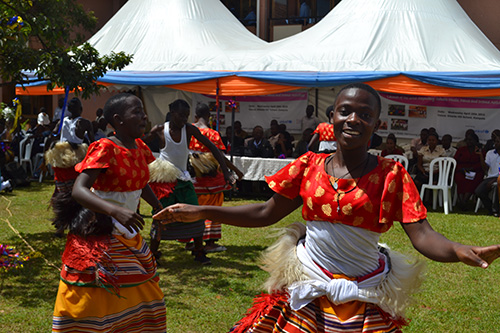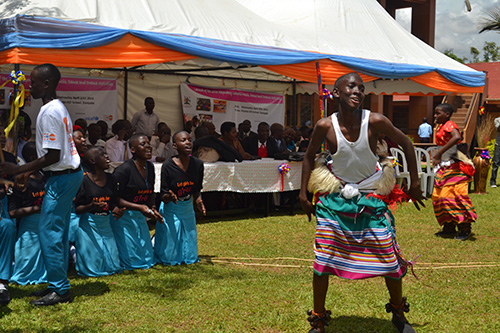News
Girls in Uganda become SDG "ambassadors," fight teen pregnancy with poetry
- 12 August 2016
News
KAMPALA, Uganda – Talking about sexual and reproductive health is not easy, especially in the conservative corners of Uganda. But the girls of Buddo Secondary School found a powerful way to address the issue: poetry.
“Plan your family to fend off poverty / To enhance your savings / To feed with quality / To take your children / To schools of quality,” they recited at the launch of a youth festival that drew thousands of students from across the country.
The Music, Dance and Drama Festival is an annual arts competition, where students showcase traditional dances, songs, poetry and speeches at events held all over Uganda. This year’s festival focused on empowering youth to help Uganda achieve its development goals. UNFPA, which supported the festival, introduced teenage pregnancy and child marriage as additional themes to cover through the arts.

Helping girls finish school, find decent work and fulfil their potential are key ways to help whole communities and countries rise out of poverty.
In this way, the girls’ message makes them ambassadors not just of Uganda’s development, but of the global Sustainable Development Goals (SDGs), which aim to eliminate poverty everywhere, said Esperance Fundira, then the UNFPA Representative for Uganda.
“Young people are the Sustainable Development Goals generation,” she said. “The people that will make the SDGs happen are these young people.”
Teenage pregnancy rates are staggeringly high in Uganda. According to the country’s 2011 demographic and health survey , nearly a quarter of girls aged 15 to 19 have had a baby or are pregnant. Many drop out as a result; secondary school enrolment rates are lower among girls than boys.
“In Agago, my home district, it is rampant,” said Bridgette Clare Aber, a 16-year-old student who attended the festival. “When you go for social gatherings, you see so many young girls who are mothers.”
Heed to our cry
The cry of the youth
This is the appeal
The song we sing:
Open my eyes to see every possibility
Parents often fail to discuss sexuality and health with their children, and, at school, “we are only given partial information,” Bridgette said. She wants to be a paediatrician and knows these plans would be derailed if she were to become pregnant. “We need to hear personal stories on why teenage pregnancy is happening.”
“Many young girls find themselves in difficult situations because of the lack of information,” said Charles Seruyange, a music teacher at Buddo Secondary School, in the central district of Wakiso.
“It is important for the schools to step in and give this knowledge,” said Jane Nabakka, another Buddo music teacher.

The students from Buddo are working to spread this information to other students.
“Empower the girl / To read to the end / A child cannot be a mother to a child,” they said in their poem, which won a top award at last year’s festival. The school went on to win top marks at this year’s competition as well.
“Let girls be girls,” said Dr. Rose Nassali-Lukwago, the Permanent Secretary of the education ministry, after hearing the Buddo students’ recital. “Give them time and space to exploit their potential.”
Educate the girls for the life that is worthy
Plan for your family for the life that is worthy
Save for the future for the life that is worthy
And love your country for the life that is worthy
In the lead-up to the festival, the Ministry of Education and UNFPA trained over 100 teachers on the issue of teenage pregnancy, including factors such as child marriage, and solutions such as access to age-appropriate information and sexual and reproductive health care. The teachers discussed the impact of pregnancy on individual girls and on the country’s socio-economic development. They also learned about communicating these messages through traditional folk songs, folk dance, plays, poems, speeches and other art forms.
These 100 teachers in turn conducted teacher trainings at the regional level. The teachers then worked with students to incorporate this information into music, art and dramas for the annual festival.
“I learned that I have to work hard. I must not get distracted or drop out of school,” said 18-year-old Sharon Mangi, from Buddo Secondary School. “I also learned that girls can do anything they want to do.”
UNFPA is currently working with the Ministry of Education and the National Curriculum Development Centre to bring culturally acceptable and age-appropriate comprehensive sexuality education to schools.